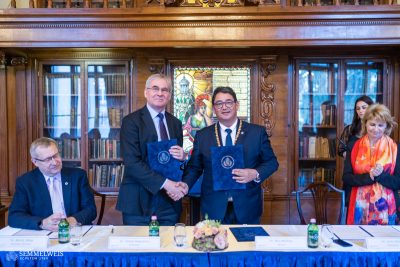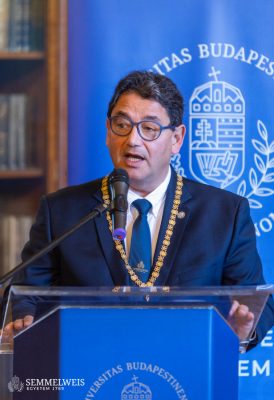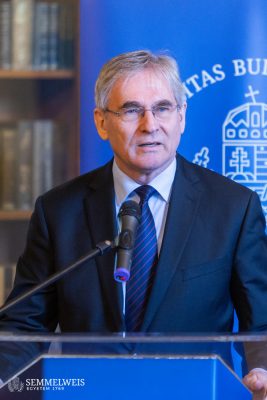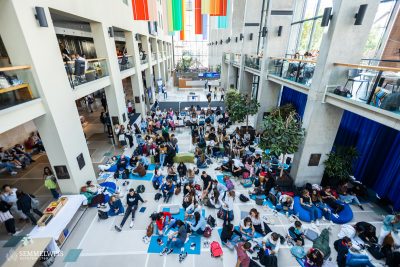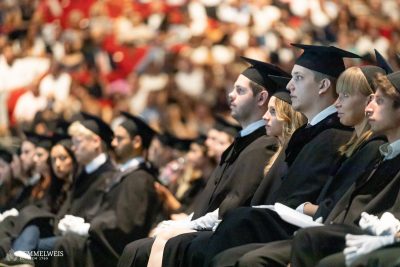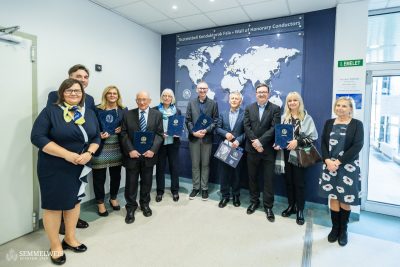Under the agreement, Semmelweis University will host two English-speaking American lecturers every year starting the next academic year. The university will also be able to host lecturers, students and language tutors outside the framework of the scholarship.
The visiting professors will participate in the work of the university for one semester, as a Fulbright scholar visiting lecturer. During this period, they will teach a course, be involved in the research activities of the university and participate in Fulbright events.
Dr. Marcel Pop, Director of International Relations, welcomed the participants to the signing ceremony of the cooperation agreement: Dr. Béla Merkely, Rector, and Dr. Lívia Pavlik, Chancellor from Semmelweis University, on behalf of Fulbright Commission Dr. Tamás Magyarics, Chair of the Hungarian Fulbright Board, and Dr. Károly Jókay, Executive Director. Among the guests he welcomed Jonas Stewart, Public Affairs Counselor at the Embassy of the United States of America in Budapest, Dr. Éva Szabó Feketéné and Dr. Attila Szabó, Vice-Rectors of the University, and Dr. Gabriella Dörnyei, Dean of the Faculty of Health Sciences.
“Sticks in a bundle are unbreakable – this proverb is true for education, research and scientific cooperation: in order to create something lasting, we need cooperation and transnational partnerships,” said Dr. Béla Merkely in his welcome address. The rector stressed that the university attaches particular importance to developing links with the United States.
“We have decades of partnerships and even friendships with overseas institutions and colleagues in education and research. Our university has long and fruitful collaborations with Harvard University, the Mayo Clinic, Rutgers University, UC Davis, Washington University and the Hungarian Medical Association of America. Their success is demonstrated by student and teaching mobility programmes, clinical research and joint publications,” the rector explained.
He reminded that Semmelweis University owes its outstanding results mainly to its scientific achievements, internationally recognized quality of teaching, high ratio of international students, prominent role in the fight against the COVID pandemic and its active participation in the international scientific life.
“We are launching a research fellowship programme to further strengthen Hungarian-American relations and, at the same time, the academic life in our country. We are convinced that this is a step which may lead to long-lasting partnerships and unbreakable ties,” Dr. Béla Merkely said.
Dr. Tamás Magyarics, Chair of Board, expressed hope that the current agreement will be assisting Semmelweis University to achieve its goals the sooner the better, reminding that Fulbright has been very keen on promoting people to people and institution to institution exchanges for thirty years in Hungary.
“When the candidates are selected for various programmes, we always put the premium on the question to what extent Hungary and the institution the candidate is coming from will benefit from his or her presence in the United States. This agreement is a result of the initiative by a former American and a former Hungarian Fulbright scholar,” the Chair of Board explained.
He expressed his gratitude to the government of the United States for financing the programme and also to the Hungarian government for the increased contribution to the Fulbright programme.
“I can testify that the programme is very fruitful. I have been to the United States twice as a Fulbright scholar. As Chair of Board, I can say that this is the beginning of a very beautiful formal friendship between Semmelweis University and Fulbright and I hope that it is going to flourish,” Dr. Tamás Magyarics said.
The Fulbright Commission in Hungary was established in January 1992, after a binational agreement was signed between the governments of Hungary and the United States. The Hungarian-American Fulbright Commission for Educational Exchange has been registered in Hungary as a non-profit public interest educational foundation.
The Fulbright Program is open to all the fields of arts and sciences. The program is financed by the U.S. government (65%) and by the partner governments (20%) and by private contributions and in kind support (15%).
Gábor Kiss
Photo: Bálint Barta – Semmelweis University
